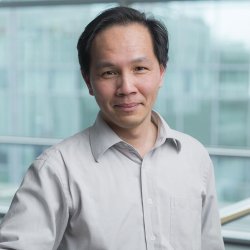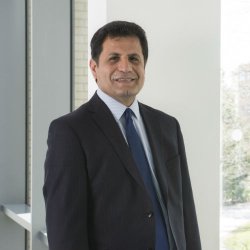Self-organising mobile networks using machine learning
This joint PhD programme of study between BT and University of Surrey will investigate how cutting-edge advancements in data-driven machine learning techniques can be used to enhance the performance of current and future mobile networks.
Start date
1 April 2023Duration
4 yearsApplication deadline
Funding source
EPSRCFunding information
- UK tuition fees covered
- Stipend of £17,668 per annum plus £3,000 top up per annum.
About
BT are at the forefront of the current 5G roll out in the UK. Through this, they have given us a glimpse of the many exciting applications that high speed and low latency communications will enable. These include augmented reality (AR), autonomous vehicles and connectivity on an unprecedented scale through the 'internet of things'. The next generation of mobile network is even more ambitious and purportedly targeting a ten-fold increase in user experienced data rates coupled with a factor of ten decrease in latency, all under stricter energy constraints. That being said, there is still significant research that needs to be conducted to enable the current generation of mobile network to realise its full potential.
This joint PhD programme of study between BT and University of Surrey will investigate how cutting-edge advancements in data driven machine learning techniques can be used to enhance the performance of current and future mobile networks. Benefits of this industry-supported PhD are an enhanced stipend, access to state of the art laboratories and expertise, as well as gaining experience of collaborative research between academia and industry. Through this PhD study, the successful candidate will have the opportunity to develop skills in experimentation, data analysis and modelling, AI/machine learning as well as mobile networks.
The concept of self-organising network (SoN) was proposed by 3GPP over 10 years ago envisioning self-configuration, self-optimisation and self-healing operations (or three-self) in mobile networks. Despite years of research efforts, the progress towards realising SoN has been slow due to the complexity involved in achieving all three-self, and the limit in traditional rule-based algorithms to deal with the complexity.
The recent breakthrough in machine learning (ML) techniques has broken the first barrier, allowing complexity to be handled implicitly in an abstract manner. Instead of involving human intelligence to understand the complexity and design a corresponding algorithm for decision making, the complexity can now be learned by a ML agent and a corresponding abstract policy for decision making can be devised based on the learning. Responding to the recent machine learning breakthrough, many researchers have since proposed ML algorithms to deal with a particular aspect of SoN with some encouraging outcomes.
Research aims
For this industry-supported PhD programme, we focus on the self-optimisation aspect of SoN. The aim of the research is to propose a ML algorithm that can optimise a specific operation of mobile networks for user experiences. Candidates for the operation to be optimised may include, but not limited to, UE scheduling, transmit power adjustment, antenna transmission mode selection, TDD configuration setting. The targeted quality of services (QoS) to meet certain user experience metrics may include user data rates, network capacity, network coverage, and others.
Later start dates including January or April 2023 may be possible.
Related links
Institute for Communication Systems Department of Electrical and Electronic EngineeringEligibility criteria
Applicants are expected to hold a first or upper-second class degree in a relevant discipline (or equivalent overseas qualification), or a lower second plus a good masters degree (distinction normally required).
English language requirements
IELTS Academic: 6.5 overall with 6.0 in writing, or equivalent.
How to apply
Please contact Dr Chuan Foh (c.foh@surrey.ac.uk) to find out how to apply. Applications can be made via the PhD Information and Communication Systems programme.
In place of a research proposal you should upload a document stating the title of the project that you wish to apply for and the name of the relevant supervisor.
Studentship FAQs
Read our studentship FAQs to find out more about applying and funding.
Application deadline
Contact details

Studentships at Surrey
We have a wide range of studentship opportunities available.

